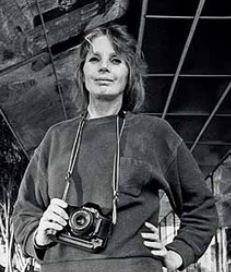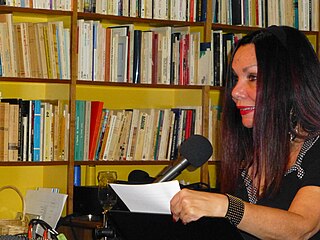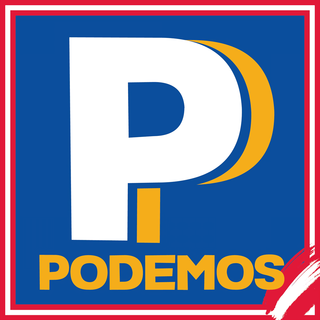
Luis Ernesto Alva y Talledo, better known as Luigi Alva is a Peruvian operatic tenor. A Mozart and Rossini specialist, Alva achieved fame with roles such as Don Ottavio, Count Almaviva and Fenton. He retired from the stage in 1989.

Óscar Luis Castañeda Lossio was a Peruvian politician who was the Mayor of Lima, the capital city of Peru, from 2003 to 2010. He became Mayor of Lima again in 2015, after being elected for a third nonconsecutive term with 51% of the popular vote, for a term that lasted until 31 December 2018. He ran for President of Peru twice, in the 2000 elections placing fifth, prior to his mayoral campaign in 2002, and in the 2011 elections, placing fifth again with 9.8% of the vote.

The Political Constitution of Peru is the supreme law of Peru. The current constitution, enacted on 31 December 1993, is Peru's fifth in the 20th century and replaced the 1979 Constitution. The Constitution was drafted by the Democratic Constituent Congress that was convened by President Alberto Fujimori during the Peruvian Constitutional Crisis of 1992 that followed his 1992 dissolution of Congress, was promulgated on 29 December 1993. A Democratic Constitutional Congress (CCD) was elected in 1992, and the final text was approved in a 1993 referendum. The Constitution was primarily created by Fujimori and supporters without the participation of any opposing entities.
The term Peruvian literature not only refers to literature produced in the independent Republic of Peru, but also to literature produced in the Viceroyalty of Peru during the country's colonial period, and to oral artistic forms created by diverse ethnic groups that existed in the area during the prehispanic period, such as the Quechua, the Aymara and the Chanka South American native groups.

Marco Aurelio Denegri Santa Gadea was a Peruvian intellectual, literary critic, television host and sexologist.

Jorge Alfredo Basadre Grohmann was a Peruvian historian known for his extensive publications about the independent history of his country. He served during two different administrations as Minister of Education and was also director of the Peruvian National Library.

José Antonio Mazzotti is a Peruvian poet, scholar, and literary activist. He is Professor of Latin American Literature and King Felipe VI of Spain Professor of Spanish Culture and Civilization in the Department of Romance Studies at Tufts University, President of the International Association of Peruvianists since 1996, and Director of the Revista de Crítica Literaria Latinoamericana since 2010. He is considered an expert in Latin American colonial literature, especially in El Inca Garcilaso de la Vega and the formation of criollo cultures, a critic of Latin American contemporary poetry, and a prominent member of the Peruvian 1980s literary generation. He received the José Lezama Lima special poetry prize from Casa de las Américas, Cuba, in 2018, for his collection El zorro y la luna. Poemas reunidos, 1981-2016.

Mercedes Cabello Llosa de Carbonera was a Peruvian writer. Influenced by positivism and naturalism, she was one of the main the initiators of literary realism in Peruvian novels. She wrote six novels of social content and critical intent, the most successful Blanca Sol (1888), Las consecuencias (1890) and El conspirador (1892). She also wrote numerous articles and essays published in Peruvian newspapers on literary and social topics. She especially advocated the emancipation of women, and was one of the first Peruvian feminists. She was a contemporary of Manuel González Prada, who, like Cabello, was a sui generis positivist; and an attendee of Juana Manuela Gorriti's tertulias, which provided her an opportunity to meet other female writers and discuss literature and feminist ideologies. Her literary works Sacrificio y recompensa, Blanca Sol, Las consequencias and El conspirador contain a repeating theme of women portrayed as " helpless, suffering creatures or as fallen heroines." This is another one of her most prominent themes in her writings. Another common topic is her criticism of the pervivan bourgeoisie, Lima's social elites, between 1860 and 1880.

Daphne Dougall de Zileri was an Argentine-born Peruvian photographer. She is most known for her iconic images of children in typical street scenes throughout Lima. The first female photographer for Caretas magazine, she published two collected volumes of works which examined solitude and intimacy. Posthumously, collections of her photography have toured in Colombia, the United States and Peru.

Gloria Macher is a Peruvian-Canadian writer living in Montreal. Her work explores social, political, ecological and existential themes. She is considered a main proponent of the contemporary humanistic literary scene.
Marta Aponte Alsina (22 November 1945 Cayey, Puerto Rico) is a storyteller, novelist and literary critic.

Dora Varona Gil was a Cuban-Peruvian poet, narrator, and missionary. After the death of her husband, Peruvian writer Ciro Alegría, she compiled, edited, and studied his work.

Podemos por el Progreso del Perú, more often known by its shortened name Podemos Perú, is a conservative political party in Peru. Founded in 2018 by economist and former congressman José Luna Gálvez. For the 2021 general election, Daniel Urresti was nominated by the party for the Presidency. In the election, Urresti placed 9th with 5.6% of the vote. While in the congressional election, the party won five seats, mainly from Lima, Callao and Ica.
María Jesús Isabel Wiesse Romero was a Peruvian poet, writer, essayist, anthologist, and film critic.

Ariela María de los Milagros Luna Florez is a Peruvian physician and anthropologist. She was her country's Minister of Development and Social Inclusion (MIDIS) from 29 October 2019 to 15 July 2020, during the government of Martín Vizcarra.

Tapada limeña was the denomination used at the time of the Viceroyalty of Peru and the first years of the Republic to designate the women in Lima who covered their heads and faces with comfortable silk mantones, revealing just one eye. Its use began in the 16th century and it spread until well into the 19th century, that is, its use lasted for three centuries and was not only limited to the "City of the Kings", but also to other important cities in the region. In Lima, the custom remained until well into the Republic, when it was relegated by French fashions.

Luis Alberto Flores Medina was a Peruvian lawyer, politician and diplomat. He was the Supreme Chief of the Revolutionary Union, a fascist party modelled after its italian counterpart, after the assassination of the party's founder, Luis Miguel Sánchez Cerro. He also served as a deputy for Lima and as Senator for Piura and Minister of Navy and Aviation, Government and Police and President of the Council of Ministers of Peru.

La yunta, also known as El trabajo or Los bueyes, is a bronze sculpture in the Paseo de los Héroes Navales, Lima, Peru.















